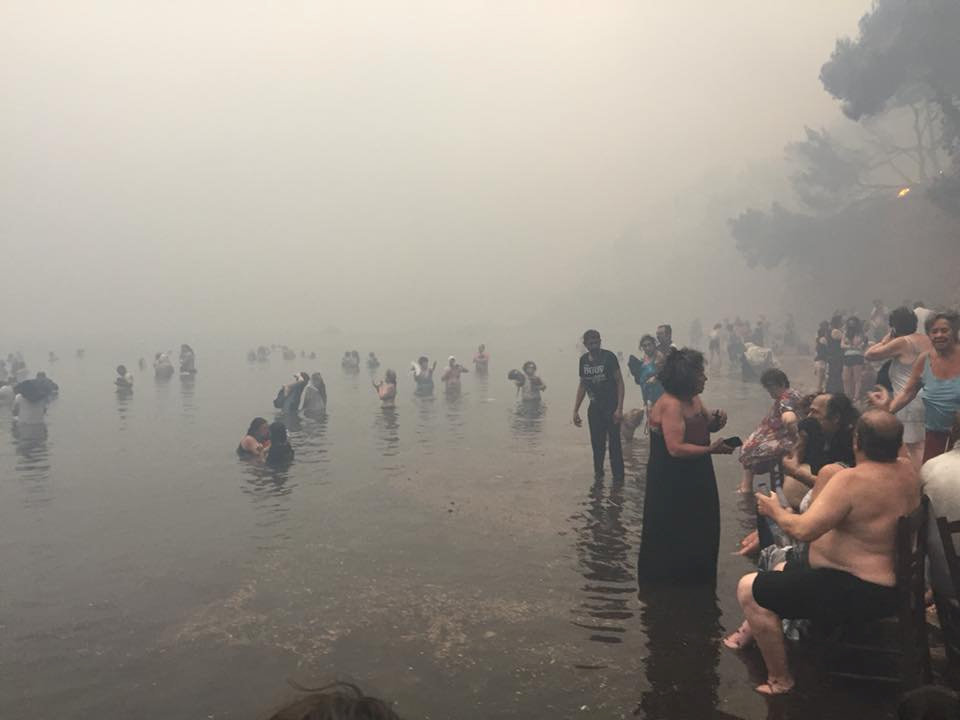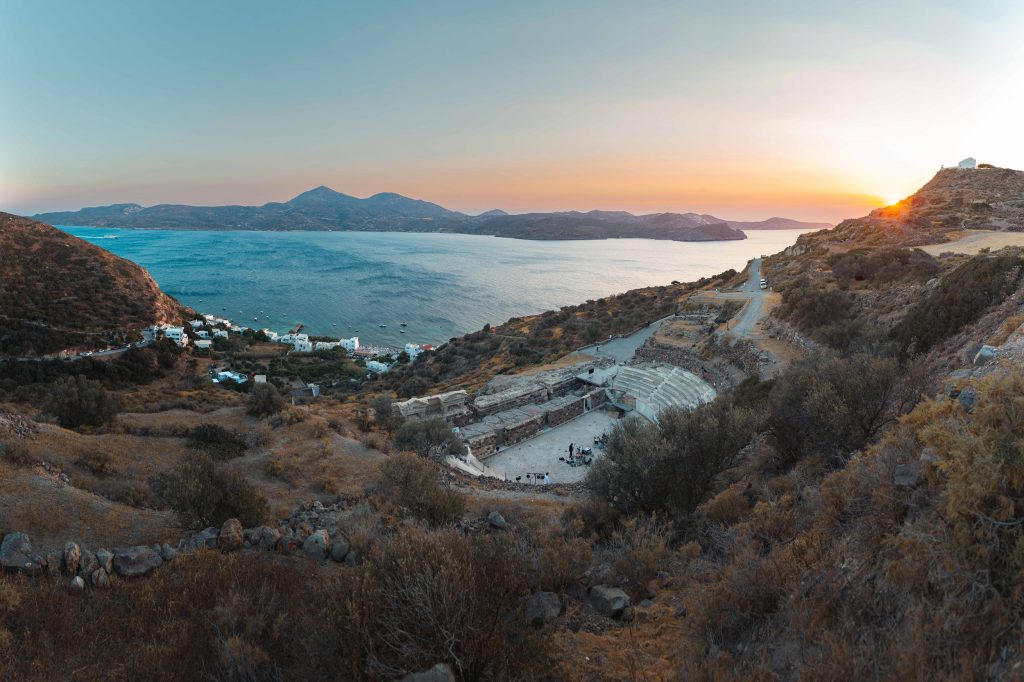When the wind shifted on the evening of July 23, 2018, the seaside town of Mati, northeast of Athens, transformed from a tranquil holiday haven into a living nightmare. By nightfall, the flames had devoured two coastal towns, left 104 dead, and injured over 140 more. Fanned by gale-force winds, the blaze tore through homes, engulfed cars, and drove panicked residents toward the sea in an attempt to escape. Six years later, the scars—physical, emotional, and institutional—remain vivid.

Athanassios Gantonas, stands inside his burnt house following a wildfire in the village of Mati, near Athens, Greece, July 27, 2018. REUTERS/Costas Baltas
Described as one of the deadliest wildfires in recent history, the Mati disaster exposed systemic failures in Greece’s emergency response systems, urban planning, and political accountability. While memorials have been held and limited reconstruction has begun, many survivors feel abandoned by a state that promised justice but has delivered little in return.
Soaring Fire

People are seen as a wildfire burns in Mati, Greece July 23, 2018 in this picture obtained from social media on July 24, 2018. KALOGERIKOS NIKOS/via REUTERS
A devastating fire ignited at 4:41 pm in the Daou Penteli area and quickly spread eastward, reaching Mati shortly after 6pm, 14km away. Investigations later determined that the fire in Penteli was caused by a 65-year-old resident burning wood in his garden.
Quickly the Mati settlement, heavily forested and congested, became a deathtrap.
Fueled by crown fires that set treetops alight, the flames raced through pine forests, residential areas, and tourist towns. Mati, a coastal village popular with retirees and vacationers, was nearly obliterated. Entire neighborhoods burned, roads were clogged with fleeing vehicles, and many residents were trapped either in their homes or in traffic.
Within two hours, the town was engulfed in flames. Winds reaching 124 km/h, temperatures soared to 800°C, the flames into a wall of destruction and panic overtook the residents and visitors alike. Many tried to flee through the town’s tangled streets, only to be trapped by fire or smoke. Others made it to the sea, where they clung to hope in the waves, waiting for the coastguard or local fishermen to rescue them.

A man holding a dog pushes an inflatable boat as locals are evacuated during a wildfire at the village of Mati, near Athens, Greece, July 23, 2018. REUTERS/Alkis Konstantinidis
In the aftermath, Mati was unrecognizable. Rough estimates reported that the fires destroyed or damaged more than 3,000 homes and scorched 14.31 km² of land. Survivors described apocalyptic scenes—people incinerated in cars, others dying just meters from the water’s edge.
Greece appealed to the EU for help, receiving firefighting aircraft and crews from several countries, including Cyprus, Spain, Turkey, and Italy.
Many victims reported receiving no warning or evacuation orders. Many pointed to a complete lack of coordination among emergency services, no alert systems, and roadblocks that, horrifyingly, may have redirected people toward the fire rather than away from it. Survivors described scenes of panic and confusion as smoke made it impossible to see or breathe.
Then-Prime Minister Alexis Tsipras declared a state of emergency and promised swift reforms. Yet, according to many, little has changed.
Accountability, or Lack Thereof

Smoke from a wildfire burning outside Athens is seen over the Parthenon temple atop the Acropolis hill in Athens, Greece, July 23, 2018. REUTERS/Alkis Konstantinidis TPX IMAGES OF THE DAY
The government’s narrative was quick to focus on this chaos and blamed unregulated development for the scale of destruction. Officials echoed this sentiment.
But the survivors told a different story—one not of natural disaster alone, but of institutional failure. As reported by the Guardian, in March 2019, prosecutors published a scathing 292-page report citing “criminal mistakes and omissions” by state services, including the police and fire department. It chronicled a breakdown of communication, failure to activate emergency protocols, and widespread mismanagement.
Phases of the Verdict

A wildfire rages in the town of Rafina, near Athens, Greece, July 23, 2018. REUTERS/Alkis Konstantinidis TPX IMAGES OF THE DAY
In total, 20 people were charged, including regional governors, the former and current heads of the fire department, the head of Civil Protection, and a 65-year-old man accused of starting the fire by burning wood in his garden. However, the court proceedings left many grieving families disillusioned.
In 2024 at the Court of First Instance, only a handful of those charged were found guilty—five former fire officials received suspended sentences convertible to fines, and the man accused of starting the fire was given three years for involuntary arson, also with the option of a fine. Fifteen other officials were acquitted. Among them, the then-chief of the Fire Brigade and his deputy were convicted of negligent homicide and bodily harm. The elderly man accused of starting the blaze by burning garden refuse, was also found guilty of involuntary manslaughter.

A man looks at the flames as a wildfire burns in the town of Rafina, near Athens, Greece, July 23, 2018. REUTERS/Costas Baltas TPX IMAGES OF THE DAY
During the Court of Appeals, in June 2025, nearly six years after the fire, a Greek court delivered its long-awaited continued verdict. Of the 21 individuals on trial—including senior fire department officials, civil protection authorities, and local government leaders—only 10 were found guilty, all on misdemeanor charges.
The verdict was met with public outrage. Relatives of the victims shouted in court: “They should have gone to jail by themselves! All innocent? There is no justice!”
The slow-moving legal process has deepened public mistrust in the country’s judicial institutions.
Public trust in Greece’s justice system and rule of law is now at a low point. Polls show that 7 out of 10 recently polled citizens have lost faith in judicial accountability.
Six years later, the scars are still fresh
While courtrooms deliberate and governments legislate, those who survived the fire continue to bear the real cost of the catastrophe.
For those who lost loved ones, homes, or livelihoods, true accountability remains elusive. Until meaningful reforms are enacted and the lessons of Mati are fully acknowledged, many fear that history could repeat itself.

Firefighters, soldiers and local residents carry a hose as a wildfire burns in the town of Rafina, near Athens, Greece, July 23, 2018. REUTERS/Costas Baltas
Behind the numbers are the personal stories of survivors whose lives were forever altered. Marianthi Chandrinou was just 17 and suffered burns on 15% of her body when the fire engulfed her neighborhood. She and her mother fled to the beach, where they waited for hours, calling the coast guard for help. Smoke filled the air. She spent two and a half months in hospital, enduring skin grafts and blood transfusions. Now 23 and working as a health visitor, she says the experience taught her empathy—but at a terrible cost.
No Closure Yet: Justice Denied

epaselect epa06919507 People light candles as they gather for a vigil for the victims of wildfires in Mati at Syntagma Square in Athens, Greece, 30 July 2018. Fire officials in Greece raised the death toll from a wildfire that raged through a coastal area east of Athens to 91 victims. EPA/ALEXANDROS BELTES
In November 2020, Greece’s parliament passed controversial legislation legalizing certain afthereta—illegally constructed buildings that had directly contributed to the scale of the Mati disaster. For many, it was a stark signal that old habits die hard.
Today, Mati remains a physical reminder of the tragedy. Despite promises to rebuild the town many plots remain charred and lifeless. Residents have received some financial compensation, but few have managed to secure the permits needed to rebuild their homes. The sense of abandonment by the state persists. The landscape—charred and hollow—serves as a visual reminder of the past and a warning about the future.

Aerial view of the area after a wildfire, in Mati, Greece July 24, 2018 in this picture obtained from social media July 26, 2018. FLYGREECEDRONE/via REUTERS THIS IMAGE HAS BEEN SUPPLIED BY A THIRD PARTY. MANDATORY CREDIT. NO RESALES. NO ARCHIVES.
The Mati wildfires have come to symbolize more than a devastating fire. They stand as a tragic indictment of failed systems—urban planning, emergency response, political accountability—and of the human cost when such systems falter. As global temperatures rise and wildfires become more common in Mediterranean countries, Mati’s story serves as a warning of what can happen when natural disaster collides with man-made dysfunction.
Will We Ever Learn?
Thankfully amidst the wreckage, grassroots support networks emerged – SALVIA and the the Greek Association for Burn Survivors- offering psychological, medical, and legal assistance to burn survivors. Yet such initiatives often operate without sustained government funding or institutional backing. Much of the burden remains on volunteers and survivors themselves.
Meanwhile in the recent years, as a fire prone country, the Greek government has invested in emergency response systems and evacuation signals.
Experts recommend better forest management, including allowing controlled burns to clear dry vegetation. Urban planning improvements—such as fire-resistant building materials, maintaining defensible space around homes, and emergency training for residents—are also essential.








